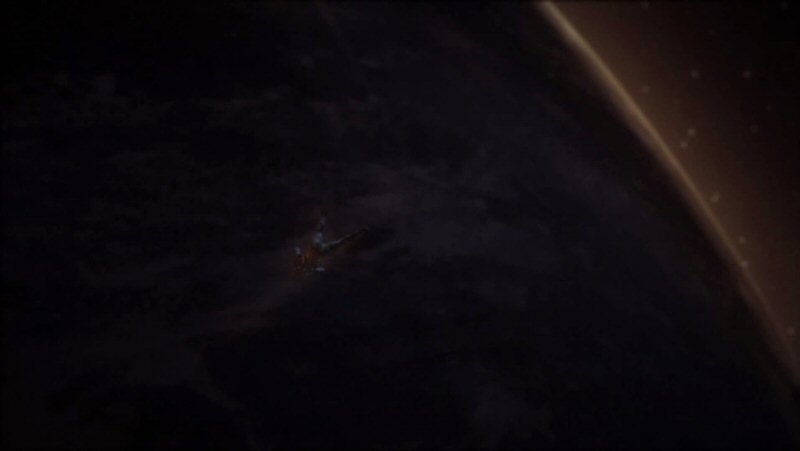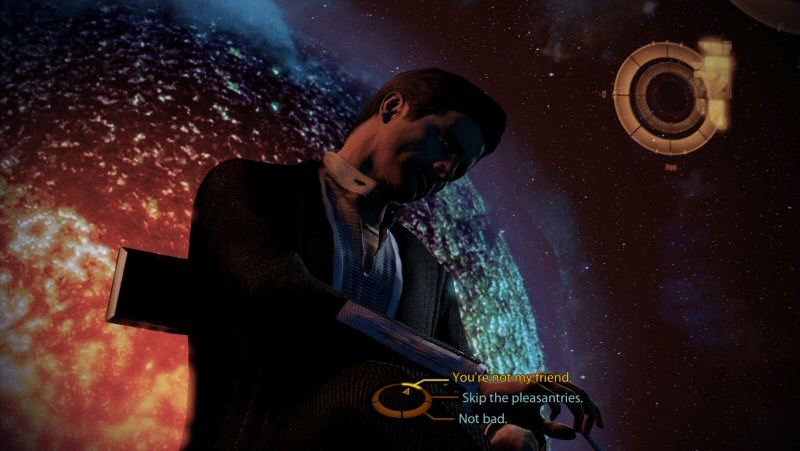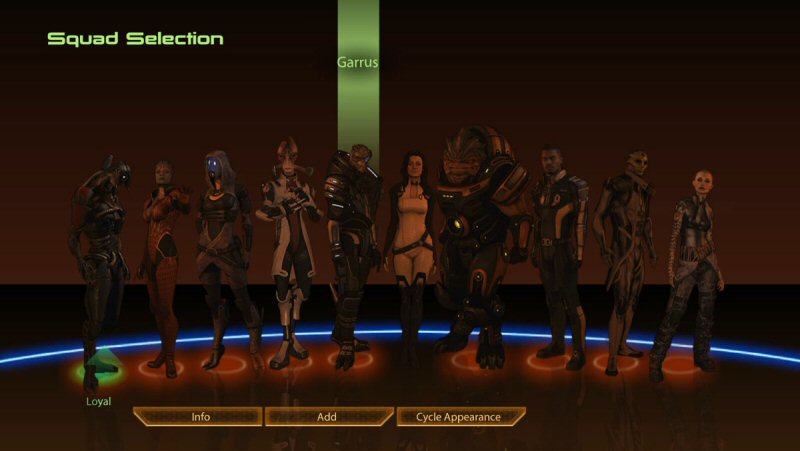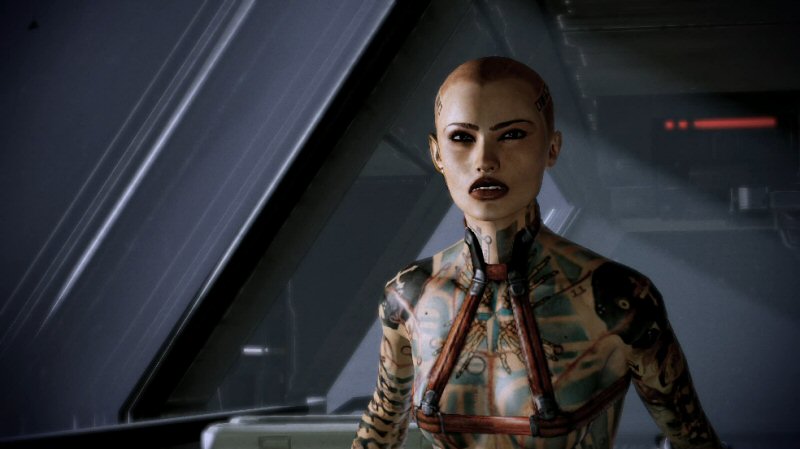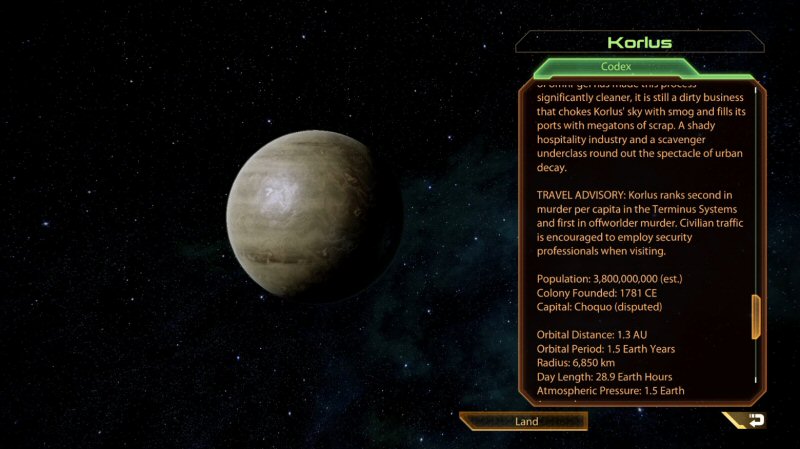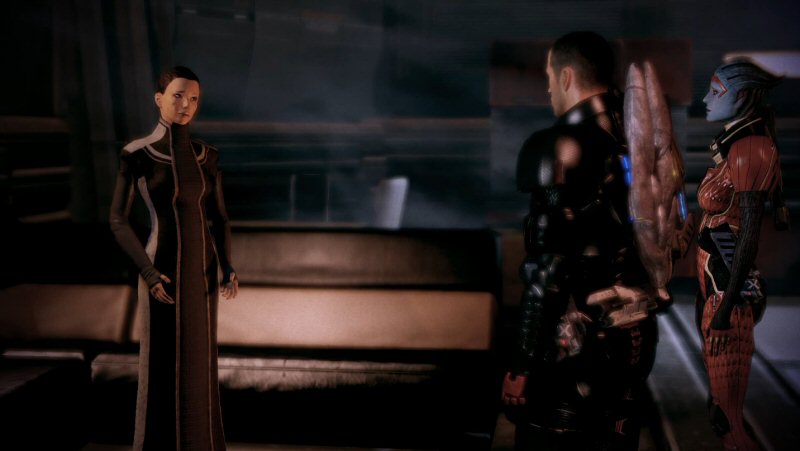Mass Effect Retrospective 19: The Importance of Peasants
Before we resume talking about our new squad-mates, let’s back up and talk about the one that joined us at the start of the game:
Miranda
Miranda is a disaster of conflicting purposes. We’re supposed to believe that this lady is a brilliant medical researcher,
and a badass merc,
and a super-biotic,
and the leader of the research project that CURED DEATH,
and a natural team leader,
and she barely looks thirty. Even Wesley Crusher wasn’t
that big of a miracle child. And then on top of this she’s got this ongoing sob story about growing up fabulously rich and having high expectations placed on her. So on top of her amazing abilities and her insufferable smugness, she’s got this horrible case of daddy issues and first-world problems.
And then she has
the nerve to be an asshole towards Jack, who was literally tortured as a child by Cerberus. The moment Jack gets on the ship, Miranda starts antagonizing her in the most childish, highschool-drama-bullshit kind of way. If Miranda is so smart, then why would she support the idea of recruiting an unstable psycho killer for a serious mission? And even if we buy that, how stupid and childish is it to deliberately provoke and taunt her like this? If Miranda is such an awesome leader, then why is she doing the thing most likely to make Jack freak out and cause problems? (And it does indeed cause problems later.)
This would be fine, in a “drama resulting from different viewpoints” kind of way, but you can’t call her out on her bullshit. Like Jacob, she trusts Cerberus and thinks they’re okay despite overwhelming evidence to the contrary, but she never discusses why. She doesn’t have to defend Cerberus because the writer doesn’t allow you to challenge her on Cerberus. Technically that’s the writer’s fault, not hers, but the problem arises when the player is talking to her and so she ends up taking the blame for Shepard’s neutered dialog wheel.
If I could have shoved Miranda out of the airlock, I would have done so. She was the PR rep for the entire premise of, “I’m not working for Cerberus but actually I am and they’re not evil except obviously they are.” On top of all her other problems, she was the embodiment of the most frustrating bit of railroading in the game.
I could accept her as a miracle child of super-talent, or I could accept her as a tragic story of someone who can never live up to their perceived potential, but these two angles are kind of at odds and the writer should have settled on one or the other. We can’t be in awe of her and pity her at the same time, and certainly not while she’s so unpleasant to everyone around her.
Okay, maybe I’m being unfair. I’m sure with enough depth and nuance you could explore both of these aspects of her character. But the whole thing is ridiculously undercut by the fact that the director stuffs the camera halfway up her ass when we try to talk to her.
Miranda keeps saying, “Take me seriously!” but I can’t hear her over the cinematographer screaming “WILL YOU LOOK AT THE HOT ASS ON THIS CHICK? 10/10. TOTALLY WOULD BANG.” Conversations with her are this quadruple-frustration between her own smug antagonism, the trickster dialog wheel that keeps making you say stupid shit, the constant cheerleading for Cerberus in the face of the overwhelming evidence that they’re incompetent and evil, and the pervert cameraman behaving like a 14 year old boy.
Maybe I’d like this character design if it was given a proper chance in another game. Maybe Miranda’s problem isn’t Miranda. Maybe her problem isn’t her father, her gifts, or her ludicrous provocation of Jack. Maybe her problem is that the author expected us to take her more seriously than he did.
Kasumi and Zaeed
I can’t comment on Kasumi, since I never had her on my team. I tried to buy her DLC when doing this write-up, but you can only get it through Origin[1] and you can’t get her for money. Like I said on Twitter:
The fact that EA is helmed by idiots who don’t understand twenty-first century commerce is not my fault. I’d rather include her in this commentary, but I have better things to do than jump through a bunch of hoops to waste my money on some lame tenth-generation copy of “Microsoft points”.
The same goes for Zaeed. He’s supposedly “free” with the digital version, but I’ve logged into “Cerberus Network”, the BioWare Store, Origin, AND the EA Store looking for answers, and their help pages all link to old answers for stuff that changed years ago. I should supposedly have him, but he never shows up and I don’t know which one of these half-dozen barely-connected systems is responsible for this lapse in DLC delivery. We could blow
a few thousand words on how abominable Origin is compared to Steam and how it seems like EA still doesn’t grasp the fundamentals of “Digital sales are about convenience”, but that would drag us away from the game at hand.
Disclosure: About a month after writing this, I took another crack at buying DLC and managed to get The Citadel DLC for Mass Effect 3. It wasn’t as big a headache as it looks like it’s going to be when you start the process, and I didn’t end up with money tied up in useless BioWare Points. On the other hand it was still confusing, obtuse, and odd in several different ways. Also, they need to lower their prices. All DLC is still launch-day prices, which is absurd. In any case, EA really needs to look at what their larger, more powerful, more profitable, more market-dominating rival is up to.
Maybe Kasumi and Zaeed are just so gosh-darn wonderful that they redeem the whole game, but I doubt it. We’ll have to go on without them.
Grunt
I like the switchup the game does here. You’re sent to retrieve Dr. Okeer, a Krogan scientist. But then there’s a plot twist, Okeer dies, and instead you end up with Grunt, his vat-grown adolescent Krogan super-soldier science project.
Grunt is a fine character. His loyalty mission sends you to the Krogan homeworld and gives you a look at his culture. It also gives you a chance to catch up with Wrex, assuming you didn’t play Mass Effect 1 wrong. But Grunt is also a little thin on characterization. He’s sort of a newborn, so he doesn’t have any personal anecdotes or opinions on galactic culture, technology, or politics. He does pretty much what it says on the tin, and I don’t have a lot to say about him. In a game where the roster features 12 potential companions, he feels kind of superfluous. There’s nothing wrong with him, but anyone who isn’t in your list of top two companions is going to spend most of their time on the ship, and I’ve never seen Grunt make anyone’s list of favorites.
So rather than talking about Grunt, let’s talk about this shift in focus from “worldbuilding” to “character building”.
The Importance of Peasants
In Mass Effect 1, there were four main worlds to visit on your quest, plus the Citadel and Iilos. Aside from Therum, they all had a certain degree of universe-building going on. There were people to meet who weren’t directly related to your main goal. You’d run into regular people who would tell you stories that would help you understand how this world worked.
Something like:
John Q. Peasant:
At first the plague seemed like a lucky break. Before that, the only place that would hire Humans was the refueling station, and that's hazardous work. But then the plague hit and suddenly there were lots of jobs open and everyone wanted to hire me because I'm immune."
(Looks down, rubs hand on back of neck awkwardly.)
But now? Nobody's coming to the station these days, and my Turian buddies won't visit me anymore. They won't even talk to me. I dunno. This job won't do me much good if the whole colony dies out. I wish things could go back to the way they were.
And then maybe he’d ask you to grab [some bullshit item] from [place where you’re already going] for him. When the quest was done, he’d give you a picture of how life on the station has changed because of your actions, or what people think of it.
The point of the quest wasn’t to get you to fetch the quest item, the point was to give you a reason to talk to this peasant before and after your adventure. This would put your actions into a more local context. In just a few lines of dialog it gives you a sense of how the culture around here works, what daily life is like, and gives you a frame of reference for how Humans are doing compared to other races. Without these quests, you might assume everyone feels the same way about the council, or other races, or Spectres, or Shepard. These moments give us different viewpoints, which make the world seem larger and more complex. It puts a personal face on a tragedy and maybe even helps build a little emotional connection. The quest reward was just a little incentive to seek out other people to talk to.
But here in Mass Effect 2 they’ve sacrificed breadth for depth. The text blurb for the planet where you meet Okeer and Grunt sounds pretty interesting:
It’s supposedly this polluted, corrupt, crime-ridden landfill of a planet with 3.8 billion inhabitants. On top of all its other problems, it’s currently suffering from an internal power struggle.
If this had been Mass Effect 1, then we’d probably have started off this mission at some sort of civilian site, perhaps an outpost or village. We’d talk to the locals, and all the stuff from the text blurb above would be portrayed or hinted at. NPCs would also give their thoughts on the distant base that Okeer is running: What they thought of it, how its presence impacted their lives, how long it’s been running, and even hint at what we’ll find there. Perhaps they comment on how many mercs travel to the base, but very few return. Or perhaps someone will remark on how curious it is that the place is always receiving Krogan supplies, but they never see any Krogan going in. They might also remark on the planet in general and round things out with their thoughts on the Citadel or the Council races. Then we’d jump in the Mako, drive to the base, and
then we’d have our shooty bits. Those early conversations would whet our curiosity, and then we’d get a nice payoff when we learn what’s really going on.
But none of that text blurb makes it into the game. None of it. Okeer’s base is a completely arbitrary maze of chest-high shootin’ walls with no indication that anyone lives there, works there, or does anything except shoot stuff. You do meet one Blue Suns Merc who gives enough exposition to explain that waves of Mercs are fighting waves of Krogan, but his exposition is a far cry from the stories you take part in at Zhu’s Hope.
He covers the basics, but there’s no worldbuilding, no culture, no flavor-text civilians, and nothing for you to learn or think about until you reach Okeer. From a worldbuilding standpoint, this mission is completely sterile.
I understand you don’t have infinite money, and if you increase the number of locations in the game then you have to cut something else. But while I can appreciate the financial realities that caused this, I can’t help but lament at the loss of depth and nuance. It’s one thing to hear about ExoGeni using humans as test subjects, but it’s another thing to see what this did to the lives of people at Zhu’s Hope. It’s one thing if the Codex tells you that the Rachni are scary space bugs, but it’s so much more potent to see how the Rachni ravage and terrify the research staff on Noveria.
In the struggle to show instead of tell, these flavor-text peasants are the key to making places memorable and building an emotional connection with the locations we visit. I’d go so far as to say they’re one of the key things that gives a game the “Classic BioWare” feel, and their absence is why so many old fans aren’t connecting with the newer titles.
There are a few “fetch quests” in Mass Effect 2, but the writer has apparently forgotten what they’re really for. If you run around Illium or the Citadel you can find a few people who need some object. Then you get the object and bring it to them for a reward. But they have no dialog wheel, no story, and nothing they say helps build up the world. It’s just a way to get credits and XP, which were never the point of these quests.
One exception is the Quarian accused of theft on the Citadel. That one quick exchange tells you how people feel about Quarians and how bureaucratic C-Sec can be. It’s this wonderful flash of conversation-based storytelling and worldbuilding, and this game needed a lot more of it.

The Mass Effect 1 style “villages” are a good place to sell the audience on an idea that’s hard to swallow. If you’re trying to convince the audience that anyone seriously believes that Cerberus is a “humans first” group and not a cabal of sadistic, moronic, mad-scientist terrorists, then this is the place to do it. Have a bunch of people that were abandoned by the Alliance because of some bureaucratic politicking, and Cerberus came to help them in some way. If you want to convince us that Shepard is “A hero, a bloody icon” after the events of Mass Effect 1, then have us bump into a fan on some backwater world who has heard of Shepard and wants an autograph. If you want to motivate us to go after the Collectors, then let us meet just one colony of people who are scared stupid, watching the skies furtively, and desperate for Shepard’s protection. Show their anger towards the Alliance, or their willingness to believe in anything – even Cerberus – if it will give them hope.
Yes, the world of Mass Effect 2 is larger than Mass Effect 1 in terms of raw square footage, but much of it feels so very empty, unfulfilling, and lacking in the kind of humanity that made the series special to begin with. And even when the spaces do engage in a little worldbuilding, they usually reaffirm what we already know from the last game[2], instead of attempting to sell us on the shaky premise of this one.
























